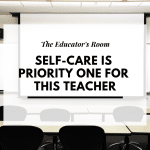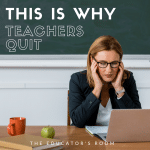The Educator’s Room Interview with the Hosts of The Great Teacher Resignation Podcast
There’s a new teaching podcast in town, this one focused on teacher wellness, in and out of the classroom. .
Ali Simon was a high school Spanish teacher for seven years and left teaching in 2019 because of the inflexibility of her schedule and the family logistics as a military spouse. She is now a project manager for a youth apprenticeship grant, where she loves that she still gets to support young people and education.
JoDee Scissors was in education for thirteen years, primarily as an elementary Spanish immersion teacher. She left in 2019 because she felt stifled by the rigidity and structure of school systems. She wanted a creative outlet for what she’s most passionate about. She is now the CEO of Paper Planes Ed, where she’s tackling education issues she noticed while teaching, especially in the arts.
Emma-Kate Schaake: In your early episodes, you mention that the point of the podcast is not to convince teachers to leave. Instead, what is your goal with this podcast?
Ali Simon: Our mission with the podcast is to discuss current issues in education and career mobility outside of the classroom. We know that teachers train for this profession for years, and they have many skills that they’ve acquired and strategies for working with all types of people and learners, and so we feel that their contributions to education and other sectors should really be valued. Our goal is really to communicate that teachers can be successful in other fields too.
Teachers are trained professionals who are smart, flexible, and innovative, and their worth in our society is devalued. When we pass on the teaching torch to those who are not certified or trained, we’re contributing to the narrative that this is not a position that is valued in our society.
EKS: The Great Teacher Resignation is obviously very of the moment as states are taking drastic measures to fill openings. (Florida is allowing veterans to teach without teaching credentials, Arizona is letting people without any degree whatsoever teach, and rural districts in Texas are moving to four days a week.) What do you think about these ideas, and what do you think should be done about said shortages?
AS: I think the problem with these policies is they’re not actually going to fix the problem. I actually did an alternative certificate in Florida through a community college. I didn’t go to school for education; I studied Spanish. I think the best way to bring new teachers is by putting together quality programs, like teacher apprenticeships, where they can learn and earn at the same time. Then, they come out of their program debt free.
A lot of what we hear from teachers is that they have these looming student loans, salaries are low, and honestly, it’s really hard to survive, especially if you’re a single parent or a sole provider. It’s not an immediate solution because those programs take a little while, but I think that is a much better solution. Florida has put forth a lot of money to support veterans transitioning, and a lot of that includes a lot of technical and apprenticeship training, so that could easily be written in.
JoDee Scissors: These state plans don’t address why we aren’t sustaining and retaining teachers. There are lots of trained, certified teachers who are choosing not to come back so that eventually will lead to a shortage. We know there are teachers out there; it’s policymakers and school district administrators who are not addressing the actual issues of teacher wellness and a sustainable, healthy work environment.
And honestly, those decisions that they are making in those states are contributing to the negative narrative about teachers. Teachers are trained professionals who are smart, flexible, and innovative, and their worth in our society is devalued. When we pass on the teaching torch to those who are not certified or trained, we’re contributing to the narrative that this is not a position that is valued in our society.
We want to challenge these narratives and make sure their worth is elevated. Because when you feel good about yourself and your worth in society, you feel empowered, and that is not what’s being done right now.
AS: And that’s not what’s best for students. What’s best for students is someone who is prepared to enter the classroom, who has the necessary degree, background, and student teaching. If you take that away, you’re not providing students with the same level of education.
JDS: And what is that telling students? If we’re just giving the job to anyone? What message are we sending those students? Everything we do, they’re watching.
[Teachers are] resourceful, deep listeners, referees, and allies. And we truly believe that you name it, a teacher has done it, or they will learn how to do it to get the job done.
EKS: According to an NEA study, 90% of educators feel burnout is a serious problem. What would you say to teachers who want to STAY in the profession?
AS: Sometimes, letting those extras go, even for a year or two, can help you sustain a teaching career. I’m giving you permission to say no, but it’s hard. After I left teaching, I actually still coached speech and debate for a year because it was so hard for me to let it go. But paring down the extra stuff so you can focus on the classroom teaching part.
JDS: When you start saying no and setting boundaries, you start to open up opportunities to explore yourself and what you’re most passionate about. What is that niche in education that you could really flourish in? Mine, personally, was technology and the digital landscape. In my classroom, I was always innovating with technology, training people, and creating digital content.
AS: Another piece of advice I would give is maybe switching schools. I had been teaching public school, but when we moved to New Orleans, I taught at a private school, and I went from teaching 150 students to 70. Or some elementary schools have one teacher teaching English and another teaching math. Making changes within a school or even going to a different school can really help; there are things to try before deciding to leave the classroom.
JDS: Yes, a lot of self-reflection. Why are you unhappy, anxious, or unmotivated? You have to be able to identify your feelings and the root of those feelings before you can move on.
EKS: On the show, you mention that you want not only teachers but people with hiring power to listen to the podcast as you highlight the skills of former teachers. What do you think some of those most powerful skills are?
AS: We talk on the show a lot about the Teacher Brain. We define the Teacher Brain as a uniquely developed mind formed by one’s natural ability to connect with learners and strategic education training. Teachers hold and implement a variety of skill sets besides just instruction. They’re innovators, entertainers, problem solvers, multitaskers, data analysts, and they possess the ability to be adaptable. They’re resourceful, deep listeners, referees, and allies. And we truly believe that you name it, a teacher has done it, or they will learn how to do it to get the job done.
What we hear from employers is that teachers can quickly adapt and change course as needed. They’re good at improv, improving every day in their classrooms. These are skills that you don’t really learn in a lot of other professions.
JDS: Yes, and it’s not just the work. It’s about the teacher’s ability to work with adults. As teachers, we work with students with diverse needs and backgrounds, and we have a deep empathy for differences, and those children become adults. So, when you start transitioning to work with adults, your Teacher Brain is just as valuable for its ability to collaborate.
EKS: What has been your favorite interview and episode so far? Why?
AS: We’ve been really fortunate to build relationships with some of the people we interview, so for me, it’s our interviews with Adam and Ashley McClean, both former educators and listeners of our show. It’s really nice to feel like you’re connected with the people who are listening. Their “Prioritizing Family” episode really hit home for me because I left teaching because I couldn’t do everything for my family with a spouse who was gone part of the time. A close second would be the Eric Friedman episode (“Why Hire Teachers”).
JDS: I’ll say “Unpacking Teacher Grief” because my departure was a year-long, very emotional experience, with those emotions starting even six years before that. So I had to unpack a lot of my history and behaviors. It felt good to talk about that, and we had many people reach out to us about how they feel. I just felt connected to others and with Ali sharing that experience. It’s the message that we’re not alone in this; there’s someone out there who’s feeling the way you are, and you don’t have to do it by yourself.
If we look at our top episodes, the number one episode is “Leaving the Salary and Benefits,” everything following is about feelings. So that just goes to show how much finances drive people’s decision to wait it out or not address your feelings. We’re going to dive back into that with the financial advisor Erik Garcia because your financial behaviors affect your mental health. And that goes along with teacher mental health and how leaving a salary and benefits can prevent you from addressing the real issue.
EKS: What do you see as the vision and dream of the podcast and space moving forward?
AS: We started this podcast because we really connected on this topic, and we love teachers, and we’ve been in their shoes. We want to honor and share the positive stories as well as the challenging ones and really give hope and explicit guidance to teachers, hitting committees, and community members so they can understand the benefits that educators bring to any job, whether it’s the classroom or somewhere else.
Our overarching goal is really to change that narrative that exists of a teacher and to redefine what that means. The best way to connect with people, especially if they don’t agree with you, is through storytelling. I can see us moving toward bringing on more employers in season two, and we want to continue to diversify to make sure we have a broad range of guests.
JDS: We want to lend our platform to the voices in education and those hiring educators. Ali and I have big goals for 2023, but the root of it is that we’re teachers, and this is our new classroom platform. This is how we teach strategies for career mobility, your well-being. We are teachers at heart, and we want to continue to pursue that.
You can follow Ali, JoDee, and The Great Teacher Resignation on Instagram @tgtrpodcast and listen to The Great Teacher Resignation podcast on all major platforms.






